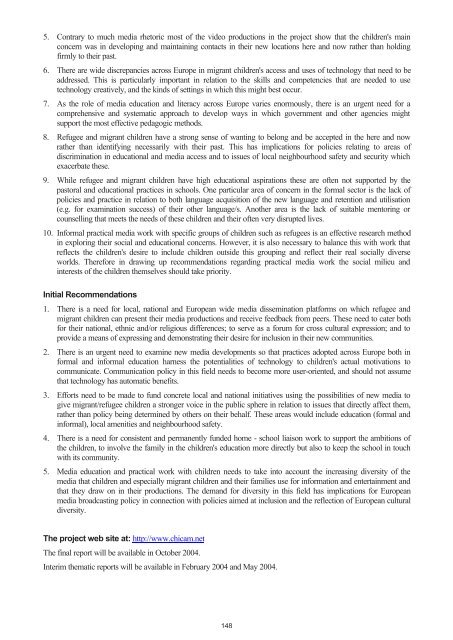briefing papers for policy makers
briefing papers for policy makers
briefing papers for policy makers
You also want an ePaper? Increase the reach of your titles
YUMPU automatically turns print PDFs into web optimized ePapers that Google loves.
5. Contrary to much media rhetoric most of the video productions in the project show that the children's main<br />
concern was in developing and maintaining contacts in their new locations here and now rather than holding<br />
firmly to their past.<br />
6. There are wide discrepancies across Europe in migrant children's access and uses of technology that need to be<br />
addressed. This is particularly important in relation to the skills and competencies that are needed to use<br />
technology creatively, and the kinds of settings in which this might best occur.<br />
7. As the role of media education and literacy across Europe varies enormously, there is an urgent need <strong>for</strong> a<br />
comprehensive and systematic approach to develop ways in which government and other agencies might<br />
support the most effective pedagogic methods.<br />
8. Refugee and migrant children have a strong sense of wanting to belong and be accepted in the here and now<br />
rather than identifying necessarily with their past. This has implications <strong>for</strong> policies relating to areas of<br />
discrimination in educational and media access and to issues of local neighbourhood safety and security which<br />
exacerbate these.<br />
9. While refugee and migrant children have high educational aspirations these are often not supported by the<br />
pastoral and educational practices in schools. One particular area of concern in the <strong>for</strong>mal sector is the lack of<br />
policies and practice in relation to both language acquisition of the new language and retention and utilisation<br />
(e.g. <strong>for</strong> examination success) of their other language/s. Another area is the lack of suitable mentoring or<br />
counselling that meets the needs of these children and their often very disrupted lives.<br />
10. In<strong>for</strong>mal practical media work with specific groups of children such as refugees is an effective research method<br />
in exploring their social and educational concerns. However, it is also necessary to balance this with work that<br />
reflects the children's desire to include children outside this grouping and reflect their real socially diverse<br />
worlds. There<strong>for</strong>e in drawing up recommendations regarding practical media work the social milieu and<br />
interests of the children themselves should take priority.<br />
Initial Recommendations<br />
1. There is a need <strong>for</strong> local, national and European wide media dissemination plat<strong>for</strong>ms on which refugee and<br />
migrant children can present their media productions and receive feedback from peers. These need to cater both<br />
<strong>for</strong> their national, ethnic and/or religious differences; to serve as a <strong>for</strong>um <strong>for</strong> cross cultural expression; and to<br />
provide a means of expressing and demonstrating their desire <strong>for</strong> inclusion in their new communities.<br />
2. There is an urgent need to examine new media developments so that practices adopted across Europe both in<br />
<strong>for</strong>mal and in<strong>for</strong>mal education harness the potentialities of technology to children's actual motivations to<br />
communicate. Communication <strong>policy</strong> in this field needs to become more user-oriented, and should not assume<br />
that technology has automatic benefits.<br />
3. Ef<strong>for</strong>ts need to be made to fund concrete local and national initiatives using the possibilities of new media to<br />
give migrant/refugee children a stronger voice in the public sphere in relation to issues that directly affect them,<br />
rather than <strong>policy</strong> being determined by others on their behalf. These areas would include education (<strong>for</strong>mal and<br />
in<strong>for</strong>mal), local amenities and neighbourhood safety.<br />
4. There is a need <strong>for</strong> consistent and permanently funded home - school liaison work to support the ambitions of<br />
the children, to involve the family in the children's education more directly but also to keep the school in touch<br />
with its community.<br />
5. Media education and practical work with children needs to take into account the increasing diversity of the<br />
media that children and especially migrant children and their families use <strong>for</strong> in<strong>for</strong>mation and entertainment and<br />
that they draw on in their productions. The demand <strong>for</strong> diversity in this field has implications <strong>for</strong> European<br />
media broadcasting <strong>policy</strong> in connection with policies aimed at inclusion and the reflection of European cultural<br />
diversity.<br />
The project web site at: http://www.chicam.net<br />
The final report will be available in October 2004.<br />
Interim thematic reports will be available in February 2004 and May 2004.<br />
148


